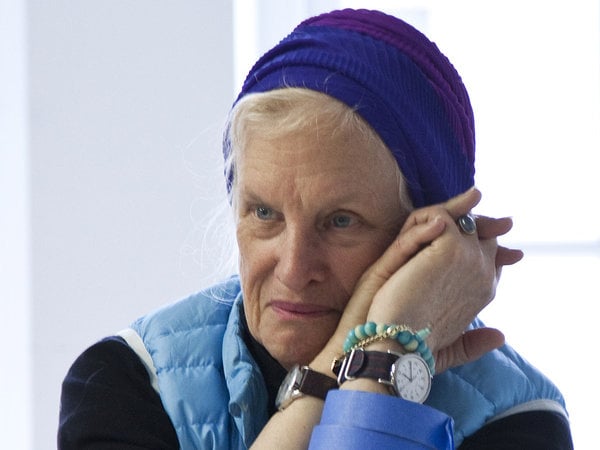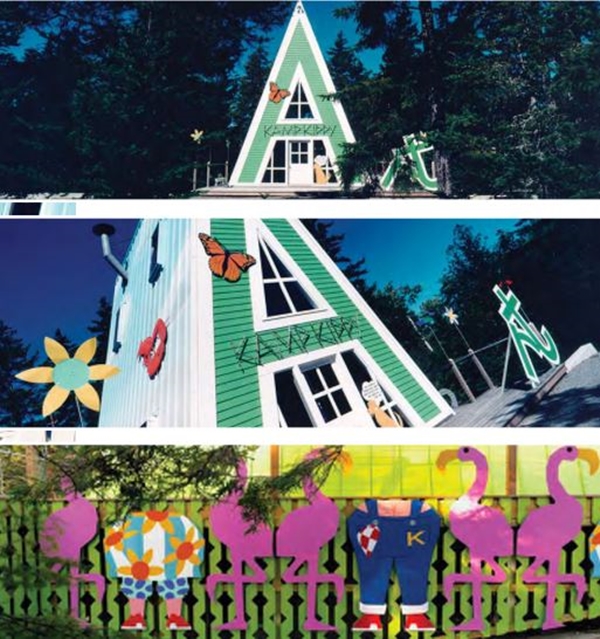People
Tributes Pour in for Beloved Art Patron Marion ‘Kippy’ Boulton Stroud, Who Tragically Took Her Own Life
The international art world has lost a pioneering and visionary supporter.

The international art world has lost a pioneering and visionary supporter.

Sarah Cascone

News of the death of pioneering art patron, artist and generous philanthropist Marion “Kippy” Boulton Stroud, at her own hand, age 76, has left the art world shocked and bewildered, but the uncomfortable truth is that the news is not entirely unexpected.
Those who knew Stroud recall an extraordinarily generous philanthropist, talented artist, pioneering promoter of women artists, and fiercely individual thinker. She was, however, irascible, prone to outbursts, and struggled recently with the dangerous and still little-understood disease of depression.
“Kippy was an extraordinary person who touched the lives of thousands of people in the art world through her philanthropy and support for art and artists at the Fabric Workshop,” said artnet News editor-in-chief Benjamin Genocchio.
“I am filled with love and gratitude for her and what she gave to the arts community,” Genocchio said, “but at the same time feel an enormous sadness. We have lost one of the great champions of the arts in this country, someone who deserved the title of a national treasure. She will be sorely missed.”
According to sources close to the family, Stroud returned to her home in Northeast Harbor, Maine, on Saturday, August 22, after a party, and took her own life. This was a family home, which she loved and opened to artists, curators, art writers and museum directors around the world for decades. Guggenheim Museum director Richard Armstrong was a recent guest.
The only child of Marion Sims Rosengarten Stroud and Morris Wistar Stroud, a highly-successful geriatrics doctor, Stroud studied at the University of Pennsylvania, earning a masters in art history. She was the Philadelphia Museum of Art‘s first director of art sales and rentals. Later, Stroud served as artistic director of Prints in Progress, an inner-city education program in Philadelphia. Family money enabled her to pursue a career in art philanthropy.
In 1977, Stroud founded Philadelphia’s Fabric Workshop, an experimental space for artists working in textiles and related mediums. The goal, she told the Philadelphia Inquirer in 1992, was “to explore, to take liberties, to be a studio and laboratory of new design, unhampered by rules and precedents.”
In 1996, Stroud rechristened the organization the Fabric Workshop and Museum, expanding the institution to include an exhibition space for its growing contemporary art collection. She organized shows that toured the country and the world and published dozens of books on art and artists. Mostly, she funded all these activities out of her own pocket, giving preference to women artists and artists of diverse backgrounds.
Over the years, the Fabric Workshop hosted and commissioned projects from important artists such as Marina Abramović, Claes Oldenburg, Faith Ringgold, Louise Bourgeois, and Roy Lichtenstein, among hundreds of others.
In a statement, the Fabric Workshop and Museum lauded its founder as “one of the art world’s true visionaries,” noting that “for more than four decades, Kippy was a curator, author, editor, educator, administrator and force for positive social change, all at the same time and always at the highest level of achievement. The board and staff of FWM are making plans not only to maintain her legacy but to advance it, as we know she wished.”

Kamp Kippy.
Photo: The Acadia Summer Arts Program.
Nearly three decades ago, Stroud opened the Acadia Summer Arts Program on Maine’s Mount Desert Island. This was perhaps an inevitable extension of the hospitality she extended to friends, who often visited her there. Popularly known as Kamp Kippy, the program fostered the creative pursuits of artists, curators, museum directors, and others in careers in the arts.
Thousands of guests and their families from around the international art world summered at Kamp Kippy over the years, with all of their travel and living expenses, as well as housing, paid for. It was an act of extraordinary generosity.
“She created a forum for an ecumenical art community,” Jennifer Grosse, chief curator of the deCordova Sculpture Park and Museum in Lincoln, Massachusetts, told artnet News of the camp, which she visited annually from the very beginning of the project. Gross was a longtime friend of Stroud’s, and stayed with her in Maine only three weeks ago. “She really did create this fabulous community of artists and curators and museum professionals that would never otherwise have been able to know each other’s work and been able to support and network with each other.”
“North East Harbor was where she was happiest as a child and her adult life, I think, and she wanted to share that with people in the art world that she cared about and believed in,” added Gross. “She made it a possibility for them to come and be with their families, which was very important to her.”
A member of the International Council of the Museum of Modern Art, ArtTable, and the American Crafts Council, Stroud was a recipient of Maine’s Skowhegan Governor’s Award for outstanding service to art and artists. Among her other contributions to the art world, Stroud was a trustee at the Philadelphia Museum of Art, as well as chair of its prints, drawings, and photographs committee.
“She was of enormous importance for us in contemporary art, and for support of our work in that area,” Philadelphia Museum of Art director Timothy Rub told the Inquirer. “She was a donor of many fine works and, from time to time, of funds to acquire things we did not have the resources to acquire ourselves. Over the last 20 to 30 years, she had a really significant impact.”
“A true original, Kippy will be remembered for her spirit, generosity and lasting contributions to so many in the contemporary art world,” wrote the trustees and staff of the Whitney Museum of American Art in an obituary in the New York Times.
It was Stroud’s committment to foster the arts that made her such a “tremendous friend,” noted Gross. “She was very much connected to whatever you were doing from the beginning. She got behind these people in their life and in their work.”
Stroud’s cousin, former Montclair Art Museum director Patterson Sims, praised the late philanthropist’s “huge heart, a brilliant business mind, formidable organizational skills, and boundless energy and vision,” in the Inquirer. “It was all packaged in an utterly complex and layered personality that seldom, if ever, could acknowledge or be thanked for what she did for others; what experiences, programs, exhibitions, and publications she made happen; or for the myriad friendships that flowered through her extraordinary largesse.”